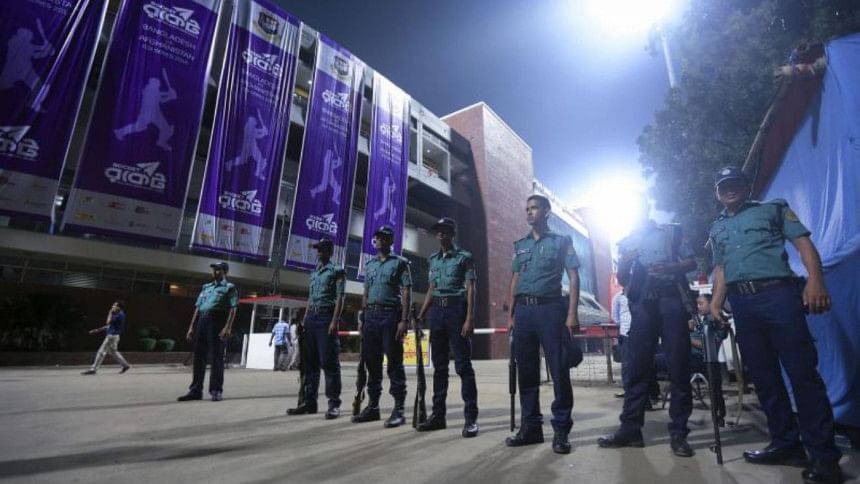Coping with the cops

Recent events relating to the serious wrongdoings of law enforcers may prompt the wary public to conclude that the misdeeds and gross dereliction of duties by our policemen have become a pathetic, recurrent reality and that nothing much can be done to change the situation.
In fact, there is a mood of hopelessness and helplessness setting in to the detriment of public confidence. Such despondency surfaces on account of the very nature of the alleged delinquent acts that involve taking hefty bribes from ordinary people to facilitate recruitment in subordinate police ranks and unlawful income by assisting drug peddling.
Can the above state of affairs be allowed to continue without effective intervention, both institutional and informal? A vital state organ maintained by public money cannot be permitted to rot on account of a lackadaisical approach. This is so because misconduct of police personnel has a lasting tarnishing effect on the public image of the police. At the same time, police inaction is unmistakably an image-shattering factor.
It is essential to focus on the suspected decay of our police system which originates from the colonial past. Has our police leadership remained a prisoner of the political party in power at all levels and has not desirably succeeded in contributing to organisational renewal and revitalisation and the nurturing of professional skills? Has our political leadership failed to introduce administrative changes in tune with the provisions of the Republican Constitution of Bangladesh?
Organisationally speaking, the blanket power of superintendence vested in the government by the Police Act, 1861, is not appropriate in a democracy. Additionally, the role of intelligence agencies has not been redefined to protect the fundamental right to freedoms of association, expression and movement. The police in Bangladesh still keep a watch on all political activities without discrimination and exclude only the ruling party of the day which gives them authoritarian powers antithetical to the democratic spirit.
If political interference has impacted police as alleged, it is mainly due to the fact that police officers themselves including some of those at the helm of affairs have evinced an undiluted proclivity to please the political bosses for their personal and professional aggrandisement. These officers set a bad example for the entire force and that is where the police-politician nexus, much to the detriment of the norms of law and justice, comes into operation.
There is no denying that the standards of recruitment in police have declined over the years and many undeserving candidates have managed to get entry through unfair means. Such appointees let the lure of the lucre take its toll as has been alleged, and never hesitate to deviate from expected norms of behaviour.
In view of the above, recruitment standards must improve by strictly curbing corrupt practices at the time of recruitment. Officers with a record of honesty and integrity should be entrusted with the responsibility of conducting police recruitment. To ensure entry of the right people, candidates should be made to undergo suitably devised psychological tests. Thereafter, during training, top priority should be accorded to instilling a service orientation and bringing about the required attitudinal changes.
One hopes that delinquent police personnel would be dealt with in an exemplary manner in the departmental proceedings in addition to being subjected to the law of the land. Criminal conduct of a section of policemen for the last couple of years has worried many. What, however, is unfortunate is that we have not adequately ventured to find out the causes of such behavioural aberrations and try to understand the dynamics of a police sub-culture. Most often we have treated the symptoms only by punishing the individual delinquent. At times, that has also failed on account of procedural shortfalls or evidential insufficiencies.
Unfortunately, the informed public entertains grave doubts about the credibility of the recruitment process of lower functionaries in the police department. The amount of political interference in such exercise is allegedly shocking and disgusting during all political regimes. Politicians remain under the erroneous impression that their chosen candidates being recruited in police department will be an asset. Such appointees mostly become a liability for the individual politician and the public at large.
In effect, we have to appreciate that the responsibility for failure to improve the standards of police recruitment and training must fall squarely on both the politicians and the police professionals. They have not risen to the occasion but that does not mean that the unhealthy practice should continue to the detriment of a vital profession.
We have to appreciate that the deviation of policemen in the form of criminal acts and other illegal activities are always deplorable as they shake the foundation of the society by eroding faith and trust in the rule of law. There should be a concentrated drive to make it difficult for a dishonest person to remain in focal position. Superior officers have to set examples by maintaining their private lives above board.
Muhammad Nurul Huda is a former IGP and a columnist at The Daily Star.





Comments